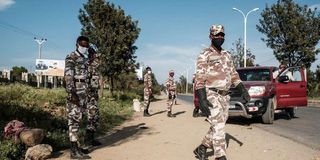Ethiopia-Tigray dispute a threat to regional stability

A file photo of Tigray police officers at a checkpoint in the outskirts of Mekele, the capital city of Tigray Region in Ethiopia.
What you need to know:
- Prime Minister Abiy Ahmed says the offensive was prompted by an attack on ENDF camps by the Tigray People’s Liberation Front (TPLF).
- The AU and the European Union have called for de-escalation and peaceful resolution to the conflict.
- There won’t be much resources and aid to stabilise Ethiopia if it spirals down the path of war.
Ethiopia has been on the ascendancy since the end of the civil war that brought Meles Zenawi to power in 1991.
After his death in 2012, Zenawi was succeeded by Hailemariam Desalegn before Abiy Ahmed Ali assumed power in 2018.
PM Abiy started off well, riding on a groundswell of domestic political support and global goodwill.
He moved with speed to stabilise Ethiopia, while projecting himself as the region’s peacemaker, earning the Nobel prize last year.
Two years down the line and a war is looming in Tigray. It was launched by the Ethiopian National Defence Force (ENDF). Abiy says the offensive was prompted by an attack on ENDF camps by the Tigray People’s Liberation Front (TPLF).
Tensions escalated when the region went ahead with elections early this year, defying the federal government’s directive to postpone the poll.
A full-scale offensive on Tigray may trigger a war that could easily engulf the country, with dire consequences for the Horn of Africa. A war could trigger displacement and transfer of populations, sending millions to neighbouring countries. Kenya could easily be overwhelmed as majority of those affected are likely to flee south.
Eritrea factor
The war will likely suck in Eritrea, which may drop her ambivalence, igniting another round of hostilities – possibly a bloody armed row with Ethiopia.
Stretched and with its hands full to address insecurity at home, ENDF might retreat from Somalia, and the sectors it controls under the African Union Mission in Somalia (Amisom) flag, thus creating a vacuum al-Shabab will promptly fill.
With potentially destabilising Somalia elections planned to take place between December 2020 and February 2021, South Sudan still fragile and Sudan in transition, the region can hardly manage another war.
Worse still, a long-time arch-enemy of Somalia, Ethiopia under Abiy has re-entered the messy politics of Mogadishu. It has picked a potentially devastating quarrel with Egypt and Sudan over a dam.
The contestation to power in Ethiopia is rooted in history. The history is shaped by politics of dominance by some tribes over others, conquests and empire expansion. More dominant communities conquered and absorbed others in the south, east and west, leading to the emergence of the Ethiopian state. This reality is etched in the minds of the Oromo, Somali and other nationalities.
The more dominant Tigrinya and Amhara are resented by the Afar, Sidama, Kemant and the Omotic (in the Omo valley) tribes of Aari, Welayta, Kafficho, Dawro, Gamo, Goffa, Yem and others. Ethiopia annexed Eritrea in 1952, triggering a war.
Soon after assuming power, Abiy led an initiative culminating in the signing of a peace deal with the Ogaden National Liberation Front. Shortly, he went on a diplomatic charm offensive to help South Sudan and Sudan achieve peace. Most importantly, he mended fences with Eritrea.
Huge risk
Ethiopia is now potentially on a downward spiral. Has Abiy miscalculated? Did he underestimate Ethiopia’s historical faultlines and the yet-to-heal wounds linked to politics of domination?
Did Abiy ignore the bitterly loud voices calling for reconfiguration of power to redress marginalisation?
The AU and the European Union have called for de-escalation and peaceful resolution to the conflict. There won’t be much resources and aid to stabilise Ethiopia if it spirals down the path of war.
With Covid-19 taking a toll on the world, resources will be directed at fighting it.
The EU wants Amisom’s mandate ended and its place taken by a political stabilisation mission.
Al-Shabab is organising its political, intelligence and intimidation wings ahead of elections. The Islamic State is “sleeping” on Galaga mountains, waiting for an opportunity to pounce.
South Sudan’s visionless leadership has no plans to lift Africa’s newest country out of a tribal conflict. Sudan is struggling through an uncertain transition. The Horn, with more than 250 million inhabitants, is watching the events in Ethiopia with bated breath.
Igad and the AU with support of the UN Security Council must act.





